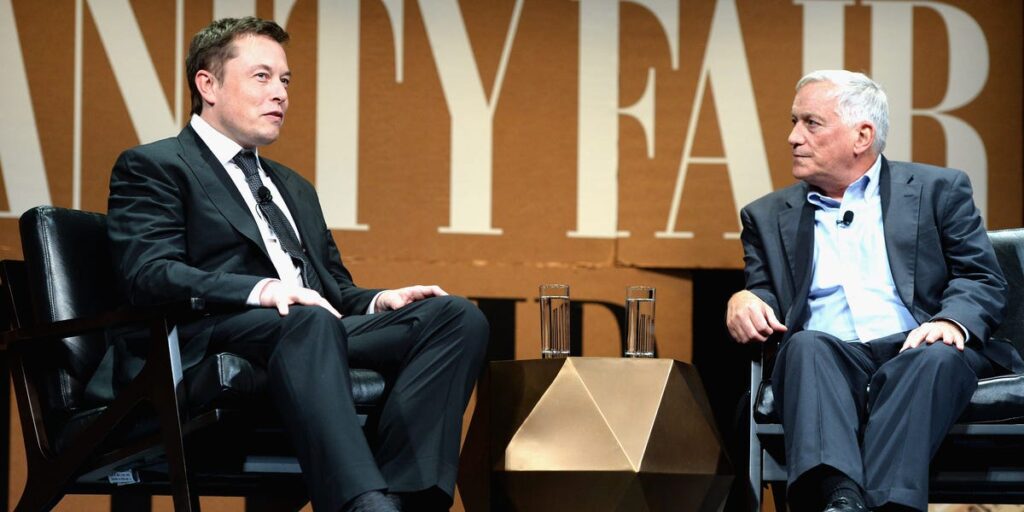- Walter Isaacson said Elon Musk’s AI motives likely stem from early ambitions inspired by sci-fi themes.
- Isaacson said Musk told him he wanted to start an AI company because he didn’t trust Sam Altman.
- Isaacson said Musk believes multiple AI developers can check each other, despite contradictions.
Walter Isaacson remembers the moment Elon Musk shared his vision of creating a new AI company while lounging at a pool at a rented house in Austin.
The author spent two years shadowing Musk in meetings and his daily life as the billionaire ran Tesla and acquired Twitter, eventually publishing the biography, “Elon Musk.”
“He’s telling me, ‘I’m gonna start from scratch an AI company ’cause I don’t trust Sam Altman,'” Isaacson recalled in an interview with CNBC’s Squawk Box published Friday.
Isaacson also suggested in the interview that Musk’s childhood aspirations and interest in science fiction may be contributing factors behind his decision to enter the AI race in 2023 with his startup xAI. The AI company competes directly with OpenAI, which he helped found and fund before a reported falling out.
“He has certain missions he’s had his whole life. He read Isaac Asimov, he read the robot series, he thought the robots might turn on us,” Isaacson said in the interview, appearing to reference Asimov’s “I, Robot.”
According to Isaacson, Musk holds the view that he has to “come in and save us from hostile AI I have to make us multiplantary.”
With SpaceX focused on one day colonizing Mars, Musk has also warned about the risks of AI, predicting that there’s a 10-20% risk that AI could destroy humanity. But he’s said we should build it anyway and described how it could have a positive impact on daily life.
He’s also been vocal about his love of sci-fi books. The billionaire has praised Isaac Asimov’s writing and credits Douglas Adams’ “The Hitchhiker’s Guide to the Galaxy” for helping him during an “existential crisis” when he was young. The science fiction novel tells a story in which a supercomputer deems the number 42 as the answer to the meaning of life, and Musk seems to have taken inspiration from it. Musk founded his AI company, xAI, with the ambitious goal of understanding “the true nature of the universe” and suggested its launch date, which added up to 42, was a reference to the sci-fi series’ answer to the meaning of life.
The idea that Musk views himself as the person to “save” humanity is something that his fellow OpenAI cofounder, Sam Altman, has alluded to.
“Elon desperately wants the world to be saved. But only if he can be the one to save it,” Altman said in an interview with The New Yorker a month after Musk launched his rival AI venture.
Musk’s feud with OpenAI CEO Sam Altman goes back several years. The two founded OpenAI together with others back in 2015 before Musk stepped down from the board in 2018. A couple of years later, Musk began publicly criticizing the AI venture. In February 2020, Musk critiqued OpenAI over a perceived lack of transparency and commitment to safety. In the last year, he’s sued the company and accused it of abandoning its mission to develop AI for the benefit of humanity by forming a for-profit entity and pursuing a closed-model AI strategy.
After dropping the initial lawsuit, Musk filed another lawsuit against Altman and OpenAI in August claiming that he was deceived into co-founding the company. Following OpenAI’s recent $6.6 billion funding round, Musk called the company “evil” for reportedly expecting investors in the round to commit to not funding five of OpenAI’s rivals, including xAI and Anthropic.
When asked about Musk’s decision to pursue a similar “closed system” with xAI after criticizing OpenAI for no longer being “open,” Isaacson said, “No one has ever accused him of total consistency.”
Musk has made efforts to increase transparency around AI models, specifically xAI’s chatbot, Grok. The company published the source code for xAI’s chatbot, Grok, on the coding repository GitHub and Musk reportedly said at a recent recruiting event that he wants to open-source xAI’s AI models around nine months after they’re released.
Isaacson, Musk, and xAI did not immediately respond to a request for comment from Business Insider.
While Isaacson declined to weigh in on whether he felt AI would be safer in the hands of Musk or Altman, the author said Musk’s idea is to spread AI development across his multiple companies and that it shouldn’t be highly concentrated in a small number of companies.
“Musk believes the more is the merrier because they’ll check each other,” Isaacson said.
Read the full article here


